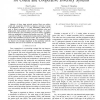Free Online Productivity Tools
i2Speak
i2Symbol
i2OCR
iTex2Img
iWeb2Print
iWeb2Shot
i2Type
iPdf2Split
iPdf2Merge
i2Bopomofo
i2Arabic
i2Style
i2Image
i2PDF
iLatex2Rtf
Sci2ools
ICC
2007
IEEE
2007
IEEE
Binary Repetition Codes and SPC Product Codes for Coded and Cooperative Diversity Systems
— A three stage network protocol that can achieve coded and cooperative diversity to improve network coverage is investigated. In Stage 1, a cyclic redundancy check code is used to detect erroneous packets. Binary repetition codes and single parity check product codes are used in Stage 2 to achieve forward diversity. The transmitter powers for binary repetition codes are optimized to improve the packet error rate. “N” Node cooperation in Stage 3 is implemented using random single parity check codes distributed across the nodes. The network coverage is shown to be improved in all three stages. The cooperation gains are found to be strongly dependent on the particular network realization and less on the number of cooperating nodes.
| Added | 02 Jun 2010 |
| Updated | 02 Jun 2010 |
| Type | Conference |
| Year | 2007 |
| Where | ICC |
| Authors | Pavel Loskot, Norman C. Beaulieu |
Comments (0)

